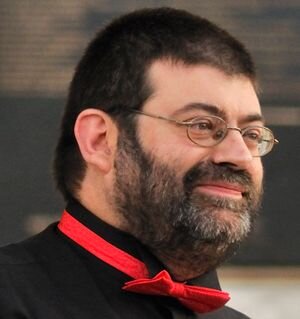
Kevin Bowyer, Ineternationally renowned Organist
Kevin John Bowyer is an English organist, known for his prolific recording and recital career and his performances of modern and extremely difficult compositions as well as displaying considerable endurance for performing pieces of incredible length. He has won numerous international organ competitions.
Organ Practice Technique
Kevin discusses that he is quite obsessive and stubborn by nature and it is this that makes him so particular in the way that he works. He learns every piece in the same way and is extremely methodical. He discusses learning pieces at half pace (or slower, basically at a tempo at which he can only get it 100% accurate) with a metronome and that he starts at the end of the piece and works backwards.
Expression in Organ Playing
Expression for an organist is to do with articulation, the gaps between the notes. Kevin seeks a lyrical quality that will make the melody sing from an early stage. He likes to be interested in narrative linear thread and he hears these patterns singing in his head even from an early stage.
Structure in Organ Performance
He believes in “listening” to phrases. He discusses the architecture, structure or form of pieces. He describes “listening” as playing a piece as being like riding a horse (melody), conscious of the horse (melody) all the time and constantly knowing not just where you are, but where you have come from and where you are going. The horse represents the melody and you need to constantly hold onto it as you travel through musical landscapes, but you also have to know where you are within the journey. It’s almost an aerial view with a Google Maps route plan showing a little person dropped as a pin where you currently are.
The Organist’s Articulation
When playing early music, Kevin discusses articulation but makes the point that you still have to be aware of the phrase. We discuss the forest, the tree and the leaves. Kevin describes different degrees of articulation, larger gaps between phrases(forest), every beat is detached from another (trees) and within each beat the shorter notes are either detached or joined according to the patterns wanted (leaves). Kevin pays respect to his teacher David Sanger and reading, “The Interpretation of Early Music” by Robert Donnington. Kevin describes the flexibility of tempo once you have finished learning with a metronome. He discusses phrases ‘breathing’. He describes changes of tempo as mostly instinctive. He describes the response to the music as being both emotional and rational, a “musical response”. Organ music is lyrical and he says that he has “always thought of organ playing as singing through the fingers”.
Musical Performance and the Soul
Kevin opens up about pieces that he learned as a teenager and that he learned them “too badly and too young” and that these pieces challenge him more as a player. He also states that, although rare, he gets frustrated when he has to play pieces that he doesn’t feel an emotional connection with. He discusses how he ‘finds something’ in a piece that he can connect with.
Performance Anxiety
I ask Kevin about performance anxiety. It is something that he rarely suffers from. He prepares his pieces so that he can perform them perfectly, with nuances, before key events. He then just ‘goes and plays’. Occasionally, however, he has experienced nerves and Kevin finds it hard to understand these occasions. He admits slipping the odd note and these are “just clumsiness”.
Musician’s Imposter Syndrome
Kevin opens up about suffering from “imposter syndrome”. This refers to an internal experience of believing that you are not as competent as others perceive you to be. Kevin talks about how he doesn’t have that ‘pazzazz’ as a performer with a massive adrenaline rush and says, “I only play the notes, that’s all I do”. The rest of the world are certainly blown away by what he does.
Breathing in Musical Performance
Finally, Kevin refers to being relaxed as he plays and how important a relaxed breath is whilst playing. He talks about maintaining an awareness of his breathing.
The Musical Novelist
Now, Kevin writes novels. He thinks back to when he was a teenager and he wrote stories. The day after lockdown started, he was up at 6:00 am writing and he has done nothing but write since. He now has four novels out and he starts writing at 6:00 am every morning. He states that there is the same narrative thread through his novels as through his music. Kevin’s novels can be found on Amazon:
In-Person or Online Music Lessons
Dr Robin Harrison, the interviewer teaches music online and in person (Yarm, Teesside, UK) and is an experienced, high standard holistic music teacher, training the whole musician to diploma levels.
Currently he offers 25% off for new students. www.the-maestro-online.com
He teaches piano, organ, singing and vocals in all styles for all ages at all levels, right through to diplomas.
More interviews will be showcased over the coming weeks:
https://www.the-maestro-online.com/holistic-musician-interviews
Choose your plan
All Courses
-
All Piano Courses
-
All Organ Courses
-
All Singing Courses
-
All Guitar Courses
All Courses + Masterclass
-
All Piano Courses
-
All Organ Courses
-
All Singing Courses
-
All Guitar Courses
-
All Masterclasses


